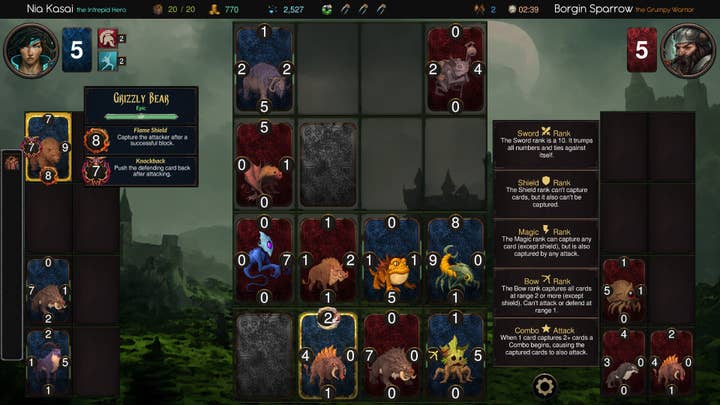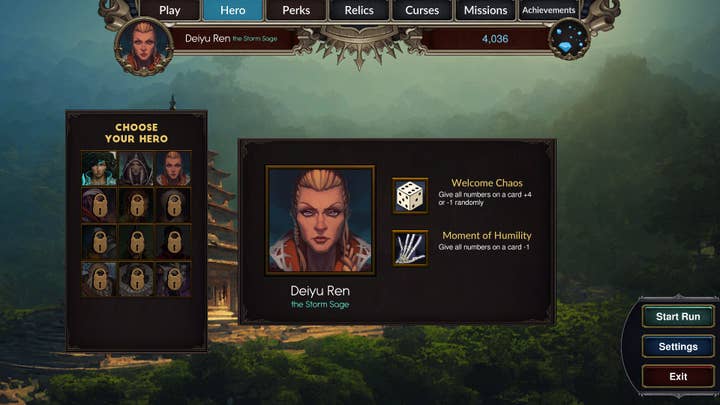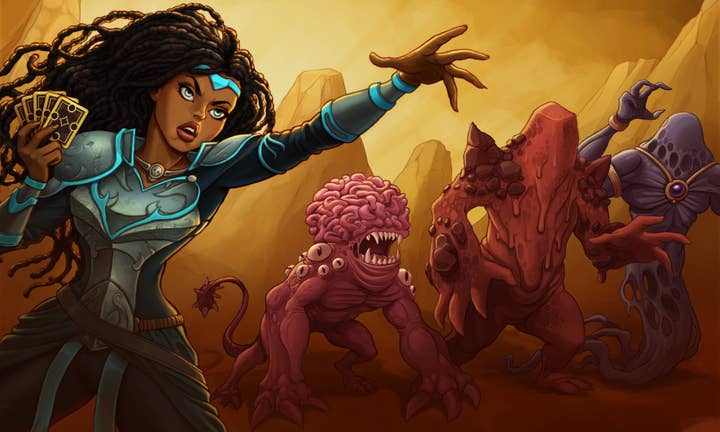Making Tetra Tactics, the Final Fantasy mini-game inspired title that wasn't meant to exist
We talk to lead developer Jabari Alii about how a side project became a full-blown title releasing after almost two years of early access, and his work at Hidden Genius Project
Roguelike deckbuilder Tetra Tactics exited Early Access after a year and a half yesterday, finally making it to its full release on Steam.
If you're not familiar with the name, it might be because the title was called Card Craft up until a couple of weeks ago – it was changed due to a trademark issue, just in time to release into the world.
This small blip aside, lead developer Jabari Alii says the development process for the title was smooth sailing. And that's partially due to the fact this game wasn't really meant to exist in this form, removing some of the pressure associated with aiming for a big commercial release.

"Tetra Tactics actually started as me taking a break from a bigger project – it was meant to be a three-month, small project, just a palette cleanser [as] I was working on this big elaborate action-RPG," Alii laughs.
He continues: "I actually started out in music. I went to Howard University, studied music education, and then about six or seven years ago, I started working on video games, doing music and sound design, and game jams. And then I slowly started to explore other avenues: game design, engineering, etc. I eventually started making my own games and got into teaching and working for various nonprofits."
Tetra Tactics is inspired by the Final Fantasy mini-game Triple Triad, Alii says, adding that he's a huge card game and RPG lover.
"What started out as this small thing slowly gained momentum [as] I was sharing it with people in my circle, and so eventually folks wanted to work on it with me, and we started thinking of these slightly more grand ideas and mechanics."
Alii brought on his friend and "genius engineer" Adrian Marple, as well as solo developer Manadream, and the three of them started development proper, with Tetra Tactics releasing in early access in September 2022.
Steam's Early Access has helped propel some indie hits to success in the past, such as Slay the Spire, but can also seem like a scary prospect for a small indie dev. But Alii says the process has been "perfect" for Tetra Tactics, giving the team the necessary engagement to keep on iterating in a smart way.
"I recommend Early Access for small groups [of] indie devs – it does give you a little bit of financial return but that's actually not the point. The point is to get that needed feedback from people who care enough about the game. If you're going on a Steam page and you see Early Access, you clearly see the game is not done. So if you buy it that means you like the idea and the concept enough to buy a game that's not finished, [which] means you're more likely to care enough to leave some feedback. And that's really what we need.
"We need folks to tell us, 'Okay, we like that feature, we don't like this feature, there's this crazy bug'. We've got a lot of that from the community, and that's been gold. It's really allowed us to dig in deep, understand which mechanics and features were working well, fixing some really nasty bugs and all of that. It's been a huge help honestly."

Alii has his own studio, called Hero's Journey, and he does ultimately want to release Tetra Tactics under the studio's name. But the nature of the project just led it to be launched as the cooperation of three independent developers rather than as a studio, with Alii also acting as publisher.
"It wasn't the intention for it to be that grand thing, and this will be the first game that I release under that studio's name. But we just came as friends excited to work on this game; whether the three of us end up staying together under that studio, it's hard to say for sure. But I know we're very excited, just working together and everything."
While acknowledging that there are always obstacles to game development (like learning when to stop adding features, he jokes), Alii goes back to that idea that it was smooth sailing for them because this wasn't meant to be that big of a project – plus partnering with trusted co-developers goes a long way.
"When it was originally scoped, the concept and everything, it was kept very realistic. My partners are also exceptional developers, they've made games solo, so there's also that sense of comfort, of knowing that, 'Hey, even if I'm not doing this thing, I can depend on others to be reliable and catch stuff'."
Even a game with a small scope runs into snags though. For Tetra Tactics, it was the early game experience and answering the question of how to engage players straight away.
"Let's be honest, everybody skips tutorials," Alii laughs. "How do you make sure that they understand what to do even if they don't actually read anything?"
So finding out how to convey important information without throwing too much at the player, and making sure that they can get to the fun part as fast as possible, was a little bit of a challenge, he explains.
Alii is hoping that Tetra Tactics will be picked up by streamers as he feels like it's "a very engaging game for those like that genre," which he describes as a "thinky strategy title."
"That would be a great sense of success for it," he smiles. "And just to have fans keep engaging with it. We are really proud of what we built."

Outside of his work as a game designer and musician (he's composed Tetra Tactics' soundtrack as well), Alii also works as Oakland site director for the Hidden Genius Project.
"As I mentioned, I haven't been in games super long – less than ten years, and I'm 38. Before that, I never even imagined being in games. I've played games all my life but I never imagined being a game developer. And, it took me actually going to GDC, having a mentor believe in me, and all of these things... I think it's just so important to me to give back to the community.
"Hidden Genius Project is a Black-led non-profit that works with young Black boys and teaches them technology, leadership, community, and just helps them realise their own amazing potential, and go out in life, and be a success. And not just be successful for themselves, but for their community and for each other."
The non-profit has a 15-month program where participants can learn anything from game development to robotics, app development, and more.
"They have a capstone project, and then we lead them into success," Alii continues. "So if they want to start their own business, if they want to get an internship, want to go to college, whatever it is, we help them get there. We have all these great, big partners, everything from your Googles to your Intels, to your PlayStations and all of that.
"I actually helped create what we call Genius Studios, which is an alumni-led game studio. And I got to give a shout out to Devon [Nutting], who was an alumni of Hidden Genius, and is actually a full-time staff member now. He's one of the educators in Richmond and is also the leader of that studio. [We] brought him to GDC last year and he [was] here again this year with his twin and they were showcasing at my event [AfroComicCon Game Night]. And it's just beautiful to see that, and to create that opportunity and pay forward."
"The ball has been dropped by a lot of these big studios... it's not okay. And it's not just the layoffs, but it's also just the conditions in which folks are working"
When asked what advice he'd give to someone just starting out in the industry, especially in a year as rough as the one currently unfolding, Alii first says we need to be decentralising the industry to create a better environment for juniors joining in.
"I think the ball has been dropped by a lot of these big studios. And we do need to talk about it. Because it's not okay. And it's not just the layoffs, but it's also just the conditions in which folks are working. I think we need to rethink what it means to run a studio, to invest in games and all these things.
"[But] to bring that back to your question: First off and foremost, just make the thing. It's not easy to make a game but it's easier than ever to make a game, with so many resources [online]. Shoot, you can go on Unity assets store and just get a ton of free assets and find a template or something. So first off, do the thing."
He adds that whether your plan is to get hired by an existing studio or create your own company, "beefing up your portfolio" is still the way to go as recruiters and potential partners will want to see what you've done and not just "words on a sheet that say that you did a thing."
"So get the experience, hop in a game jam, go to itch.io – it's got a game jam every day. Also don't be scared to build the thing. It doesn't have to be perfect.
"And then the other thing is: Finish the thing. And I tell myself this too, because as artists we're constantly starting stuff but we don't finish it. So do the thing, finish the thing, don't be scared to share it. I know people have different levels of social energy but come to events, talk to people, show them the stuff that you do. And then if you do those things, everything else just happens."
Sign up for the GI Daily here to get the biggest news straight to your inbox

